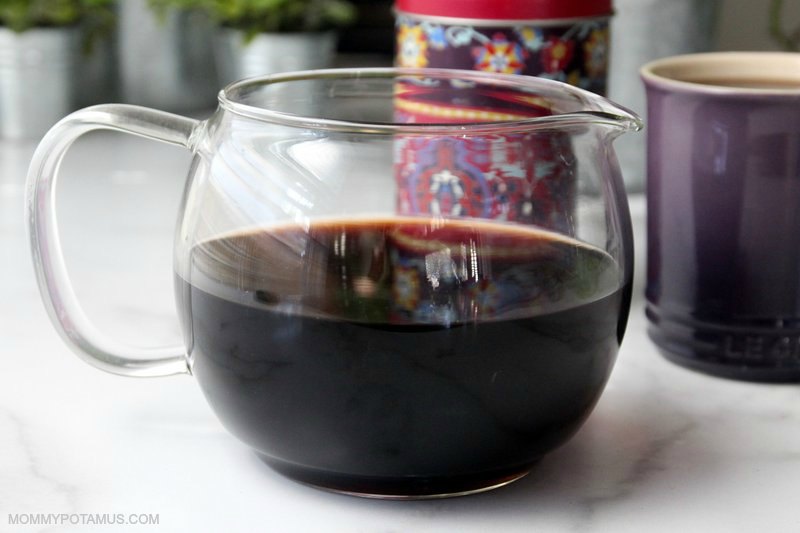
“For more than 1,000 years, herbalists have revered elder’s abilities, and mentions of the shrub are included in many important historical texts,” writes herbalist Rosalee De La Foret, adding that although it’s primarily used to support the body during cold and flu season there are other benefits, too. (1)
What benefits, you ask? Elderberries are rich in anthocyanins – which are responsible for giving the berries their dark purple color – along with other highly bioactive antioxidants that:
- Help the body absorb vitamin C – This is important because Vitamin C is essential for immune function and other processes like collagen synthesis (2)
- Have immunomodulatory and immune supportive effects – Helps balance and support the immune system so that it can function as optimally as possible.
- Support a healthy inflammatory response – According to tradition, in 1899 an American sailor accidentally discovered that port wine colored with polyphenol-rich elderberries eased his aches. (3)
- Support cardiovascular health – Elderberries are rich in a flavonoid called quercetin that supports the strength and integrity of capillaries. For people already within normal range, quercetin can support optimal blood pressure levels. (4) The antioxidants in elderberry also support cardiovascular health by protecting lipids from oxidation. (5)
Although not technically a benefit, it also happens to be delicious when simmered with a cinnamon stick or a few slices of fresh ginger. You can also brew it with other immune supportive herbs such as echinacea. However, the process of making elderberry tea is a little different than most herbal teas, and you’ll want to use a two-step process if you incorporate echinacea.
Here’s why: As I cover in this post on different types of herbal preparations, roots, bark, dried berries and woody plant parts need a little coaxing to release their therapeutic compounds. They need to simmer in water for 20-60 minutes (depending on the herb and what you’re trying to achieve), but that’s way too long for delicate flowers like echinacea.
For that reason, I suggest simmering the elderberry tea first and then adding the echinacea near the end.
How To Use Elderberry Tea
Elderberry is often taken daily (or nearly so) during cold and flu season to support healthy immune function.
I often make a big batch at breakfast for my family to sip on throughout the day. I keep it in a pitcher on the counter and they pour themselves a glass whenever they’re thirsty.
Elderberry Tea Recipe
Equipment
Ingredients
- 1¼ cups water
- 2-3 tsp dried elderberries
- 1 cinnamon stick (or a few slices of fresh ginger)
- 1 tsp dried echinacea (optional)
Instructions
- Place elderberries, water and cinnamon/ginger (if using) in a pot.
- Bring the water to a boil, then reduce to a simmer and cover the pot.
- Simmer the tea on low for 20 minutes.
- If you're not incorporating echinacea, remove the pot from heat and strain out the berries and cinnamon/ginger if using. If you're incorporating echinacea, remove the pot from heat and add it in. Put the lid back on and let it steep for five minutes before straining.
- Sweeten with raw honey or your preferred sweetener if desired before serving.
Notes
Nutrition
Frequently Asked Questions
Below are answers to the most common questions I’ve received over the years. If you don’t see your question mentioned, please leave it in the comments below!
According to the Botanical Safety Handbook: 2nd Edition, elderberries are a Safety Class 1A herb, which is the safest rating possible. Herbs in this category are described as: “Herbs that can be safely consumed when used appropriately.”
* History of safe traditional use
* No case reports of significant adverse events with high probability of causality
* No significant adverse events in clinical trials
* No identified concerns for use during pregnancy or lactation
* No innately toxic constituents
* Toxicity associated with excessive use is not a basis for exclusion from this class
* Minor or self-limiting side effects are not bases for exclusion from this class”
However, according to Herbal Medicine for Beginners, which was co-authored CommonWealth Center for Holistic Herbalism founders Katja Swift and Ryn Midura, “Large amounts of fresh elderberries have a laxative effect. Cook elderberries for food use.”
As always, check with your doctor before adding herbs to your diet, and listen to your intuition to help you make the best choice for yourself.
The elder plant “has a stimulating effect on immune function. These actions are strongest in the berries but are also present in the flowers. Elderberries can even help preserve immune function as we age, due to their high antioxidant content.
Elderflowers are a relaxing diaphoretic, meaning they assist in ‘sweating out’ a fever. Elder is especially helpful when fever and chills alternate. A hot cup of tea is the best preparation for this result. This diaphoretic action can also work emotionally, helping release intense emotions or worry and allowing the mind to relax.” (Herbal Medicine for Beginners)
Over the past few days I’ve received some questions about whether elderberry can cause an immune system overreaction called a cytokine storm.
Safety is my top priority when using herbs, so this is definitely a topic that I felt I needed to become informed about. In this article I explain what a cytokine storm is, what clinicians and herbalists say, and what I’m doing personally.
Most people describe it as sweet and tart with earthy tones. It’s lower in sugar content than most other berries, so the sweetness is subtle.
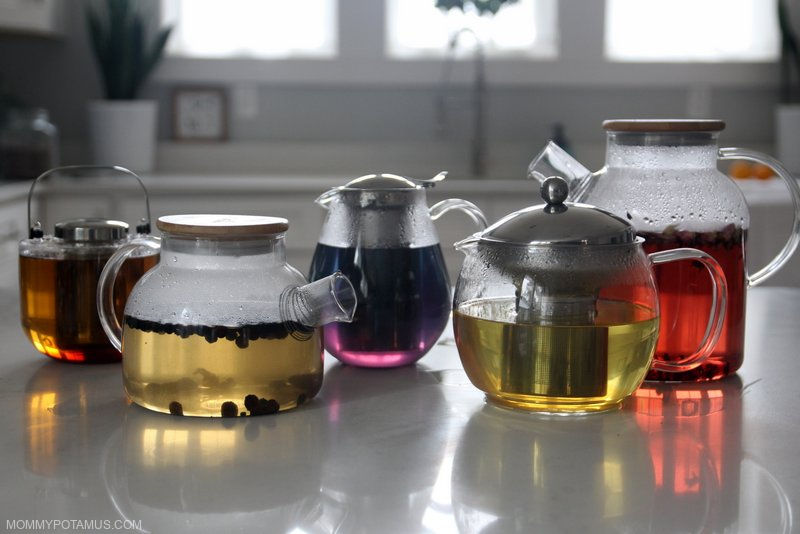
Recommended Teapots
Whenever I post about the benefits of a particular herbal tea I’m sipping on, I usually get a ton of comments like “Love that herb so much but seriously TELL ME ABOUT THAT TEAPOT.”
Here’s a list of my top five favorites, including a few that are stovetop safe.
More Therapeutic Tea Recipes
Dandelion Root Tea – This rich, creamy tea is so delicious that I always make a double batch – one cup for me, and one to replace that cup when my littles steal away its deliciousness. It’s helpful for, balancing hormones, detox, and digestion, plus it has anti-inflammatory properties and minerals, too.
Lemon Ginger Tea – This immune support tea is made with three essential ingredients, plus 1-5 optional additions based on what you have on hand.
Moon Milk – There’s something that just feels so beautiful and therapeutic – even enchanting – about whipping up a nighttime cup of moon milk with sleep supporting herbs.
In the article above I dive into its Ayurvedic origins and benefits, plus how to make it in four flavors:
- Golden Milk With Turmeric
- Goodnight Moon
- Blue Moon
- Chai
Want more research-backed natural remedies?
No problem, I’ve created a free ebook for you – Kitchen Apothecary: 25+ Natural Remedies Using Ingredients From Your Pantry – as a gift for signing up for my newsletter. You’ll also get updates when I post about safe essential oils for pregnant/breastfeeding mamas, exclusive gifts and coupons (I was able to give away a jar of free coconut oil to anyone who wanted it recently!), plus other goodies.
Sign up using the form below.
This article was medically reviewed by Dr. Scott Soerries, MD, Family Physician and Medical Director of SteadyMD. As always, this is not personal medical advice and we recommend that you talk with your doctor.
Sources
1. de la Foret, Rosalee (2017) Alchemy of Herbs
2. Jones, E and Hughes, R.E. (1984) The influence of bioflavonoids on the absorption of vitamin C
3. The East London Garden Society. Elderberries
4. Serban, Maria‐Corina et. al. (2016) Effects of Quercetin on Blood Pressure: A Systematic Review and Meta‐Analysis of Randomized Controlled Trials
5. Sahebkar, Amirhossein (2017) Effects of quercetin supplementation on lipid profile: A systematic review and meta-analysis of randomized controlled trials
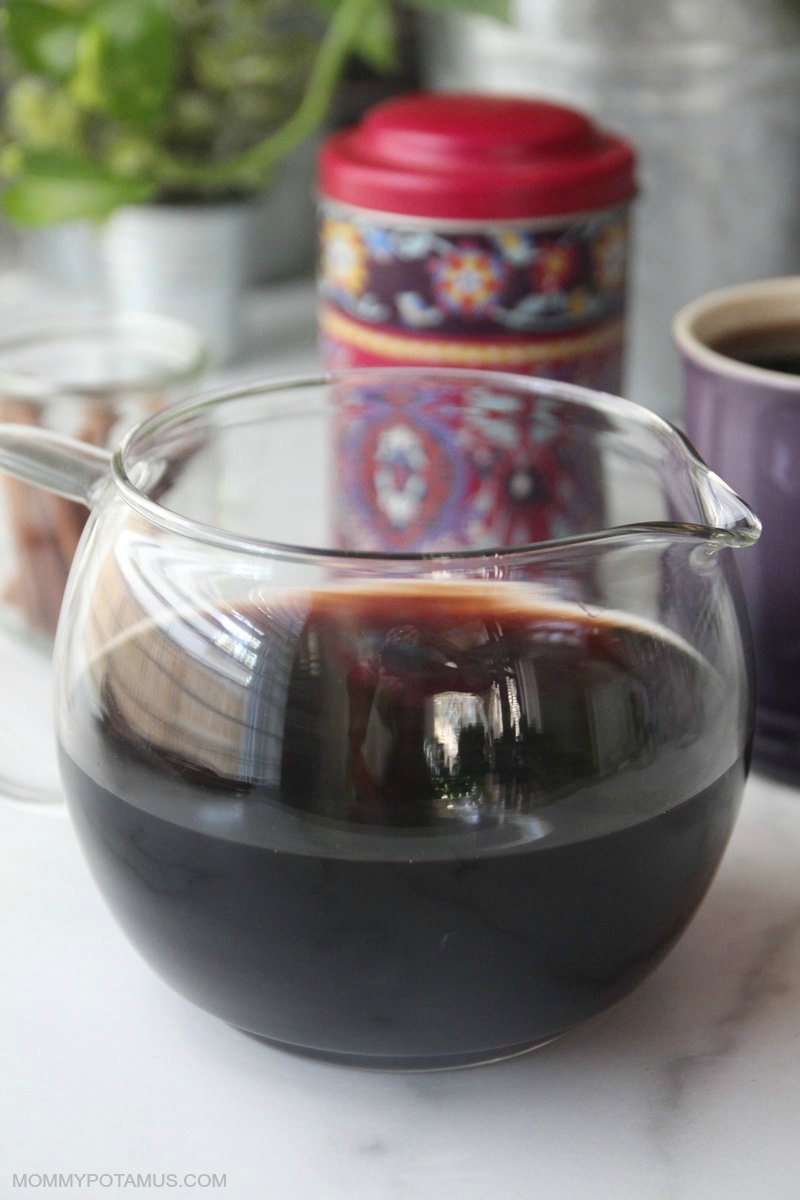

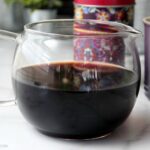
 Tried this recipe?
Tried this recipe? 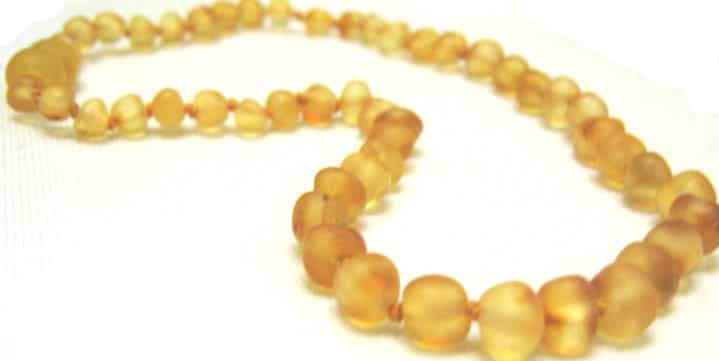
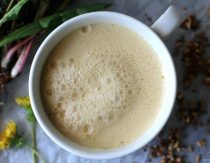


Hi! How much of this do you drink a day?
Hi, I harvest Elderberrys each year and use a steamer to extrat the juice for jelly.
I end up with about one to two gallons of juice. I would like to mix honey with the juice to make a preventive for the flu. I plan to use about two tablespoons of honey to a pint of juice. How much would you suggest to take per day to prevent the flu? I read that 1 1/2 teaspoons per day should do it and twice the amount per day after you get the flu. What is your suggestion?
I add 50% honey to the elderberry juice, stir it in while the juice is warm to dissolve, stored in the refrigerator it lasts me 2 months with no sign of degradation, mold etc., & am looking forward to trying the elderberry tea recipe in this article.
Please tell us how you store/preserve 2 gallons of elderberry juice without spoilage, I recently I had a 16 oz. bottle of it (with 50% honey added) for about 3 mos. in the refrigerator & there was mold growing inside the bottle where there had been syrup, don’t remember if there was mold on surface of syrup or not, I threw the whole thing out.
Now have 1/2 gal. of syrup in refrigerator, but in addition to the honey I added about 5% alcohol, where I live elderberry harvest only comes once a year, hope my precious syrup doesn’t spoil.
If I feel any type of upper respiratory infection starting ( runny/stuffy nose etc.) I take a table spoon of it & my symptoms are usually gone within 20 min. or less, been doing this for about 8 years.
Works the same for others I’ve given it to or bartered with.
Lately I’ve been taking a teaspoon or two per day simply because it tastes so good & it’s so full of anti-oxidants etc.
‘This is for informational purposes only & not intended as medical advice.’
My most beloved book on herbal medicine is William Harrod Buhner’s “Herbal Antivirals”, with a whole chapter on elderberries, including some pretty amazing information (with references) that I’ve not found elsewhere.
Love Love Love elderberry tea. It is one of my favorite teas!
We love our elderberries in this house! I hate wasting so after making my third or fourth batch of elderberry syrup I thought I would try making another batch with the same elderberries, using slightly less water and honey in the end. It is still turned out great! I label it the “2nd batch” and use that to make tea with. I pour a little in a cup, add my hot water, squeeze some lemon and a bit more honey and it’s our elderberry tea! I know the second batch won’t be as rich in its benefits but I figure it has to have some of them and it’s a great warm cup of tea that my kids and I enjoy when a sore throat is threatening.
I just made some syrup and thought I wonder if I can use these again. Oh well , I threw them out.
Next time I can at least make some tea.
Can you substitute frozen for dried berries? I harvest mine, bag them up and freeze them raw. I usually make a tonic with the reduction and honey. BTW, there is some benefit to the cinnamon and ginger! They are warming components to soothe cold/flu symptoms.
I’m excited to try this!
Hi Heather,
Do you have any information/links about elderberry benefits and safety during pregnancy? I’m in my second trimester and haven’t been able to find a lot of info inline.
Thank you!
I would not consume elderberries while pregnant. They contain cyanide compounds, which can be very dangerous when eaten raw. Heat destroys the cyanide, so if they are well cooked, then they will probably be ok, but why risk it?
According to the American Botanical Councils “Clinical Guide To Elderberry” there are no known contraindications for consuming elderberry. It’s important to note, also, that elderberries should never be eaten raw by anyone (pregnant or not). http://cms.herbalgram.org/press/files/elderberry-scr.pdf
Where do you purchase your elderberry? I would love to get some and try your tea recipe!
Where did you order elderberries?
I got mine on Amazon.
On Amazon u can buy elderberry tea bags. Are there benefits to drinking a cup of elderberry tea made from tea leaves
I have heard strong black seed oil is also an excellent anti-inflammatory agent, which also has analgesic properties that makes it a very good natural remedy for soreness and other pains caused by inflammation. I started taking this oil for my menstrual cramps and I have to admit the pain is considerably less. I wonder if it has the same or somewhat similar properties as elderberry tea?
Hey Heather,
are there any known side effects drinking elderberry tea while breast-feeding?
Elderberry has been shown to seriously combat the common cold as well as the flu. Science has actually shown it can shorten flu symptoms by an average of four days.
Any way to make it tasty for little kids to want to drink?
I know this question has been here for several years. However, in answer, NO.It is extremely tasty and kids will line up for it. You can also add a teaspoon to sparkling water or bottled water. But you won’t need to “try to get” children to take this.
I advise against any sparkling water, it destroys the vitamin c in your body. Anything carbonated will because of the chemicals phosphoric acid.
and yes! I am an adult and I will line up for it lol.
Just and FYI to everyone, elderberries should not be consumed raw. They do contain cyanide compounds, which are broken down when heated, but can be very dangerous when consumed raw. I have first hand experience. My husband made a elderberry smoothie. My 6 year old vomited within 10 minutes of drinking it. The rest of us had terrible stomach cramps and watery diarrhea the rest of the day. It was terrible.
Two questions.
1) Can I use frozen elderberries instead of dried to make the tea?
2) What is the best way to dry the elderberries?
Thank you. I enjoy receiving your weekly emails.
Yes, you can use frozen elderberries instead of dried, but keep in mind that dried elderberries are about half the volume of fresh. In order to make a tea of similar strength you’d want to use twice the amount called for in this recipe.
If you’re going to dry them, I would dry them using the dehydrator method described here: https://www.talesfromthekitchenshed.com/2016/09/harvesting-elderberries-picking-preserving-recipes/
Thank you for the information. I will try to dehydrate some this week.
Keep sharing the great healthy info!
Heather,
I was happily surprised to find your recipe at the top of my search! Thank you. It was perfect with the ginger! I used dried ginger and grated it into the steeping tea. I added the prescribed lemon as well as a generous dose of honey!
Hope you and your family are well! It’s a joy to run into familiar faces!
I normally make a syrup with my dried elderberries but do you think the tea is just as beneficial? I’m thinking it’s a lot easier to make!
You may want to state clearly in your recipe that if you boil 1 1/4 C of water for 15 minutes you will end up with 1/4 C tea by the time it’s ready. I’m very disappointed!
Turn your liquid down to a simmer as soon as it comes to a boil and put a lid on it. I used 20 ounces of water and it reduced to about 1 cup in an hour. I let that cool, strained out the berries, then I added my 1 cup of honey.
Suggestions for making with Instant Pots?
I haven’t tried making tea in an Instant Pot so unfortunately I can’t offer any suggestions.
Hi Heather,
I was wondering which dried Elderberry you ordered? There are several out there. Thanks in advance!
You can get them from Amazon but I order mine from Monterey Bay Spice Company at herbco.com.
Just FYI: Taking echinacea continuously for long periods of time will decrease its benefits. You should take it for a week then take a week or two off from it, then resume again.
Also, if you include elderflowers in your syrup/tea, it ‘ups’ the properties of the elderberries as well…
I made some elderberry syrup with echinacea and took it once a week alternating with my homemade fire cider and other tinctures for winter/cold/flu care.
I usually just take a shot glass full of whichever one I’m taking (don’t do this with tinctures!!! I did with one I was excited to try out after making it, forgetting it was a tincture made to take by the dropperful, and had quite a buzz for several hours!!! Oops!!! )
If I am feeling like I’m getting sick, I’ll take it once in the morning and once in the evening, or full-on sick, every hour or two.
What is the recipe for fire cider
Hi Sue, you can find my fire cider recipe here.
Fire Cider is just organic raw ACV with added herbs that you let steep for about a month, then add honey (I guess it’s technically called an oxymel). Mountain Rose Herbs blog has the “original” recipe from Rosemary Gladstar, just do a search on their website, or, there is an actual book with different variations of it called ‘The Fire Cider Book’, I believe (I have it somewhere!)
Fire Cider!: 101 Zesty Recipes For Health-Boosting Remedies M…
Hi Carol, Are you familiar with herbalis Stephen Buhner, author of Herbal Antivirals? He had this to say: https://www.facebook.com/stephen.buhner/posts/2794893860579550
In short, he prefers elder leaf to elderberry but considers elderberry a cytokine modulator.
Hello, thank you for this blog. I want to know how to do this? and what are those benefits that could I get from it?
I keep coming back to your blog. Thank you for also sharing how to make the tea! Keep up the good work.
Hi Heather
Do the elderberry have to be dried or can you use them fresh off the tree
When Mom in law was going through menopause she craved elderberry juice. She n my hubby would go pick them in the fall, then put them through the steamer-juicer and can the quarts of juice. Sometimes they would even make jelly from the juice, which at that time was too astringent for my tongue. Is there anything in them which helps alleviate “women’s problems”?
I found it very informative, have started to buy some of these herbs to make tinctures and salves, and teas.